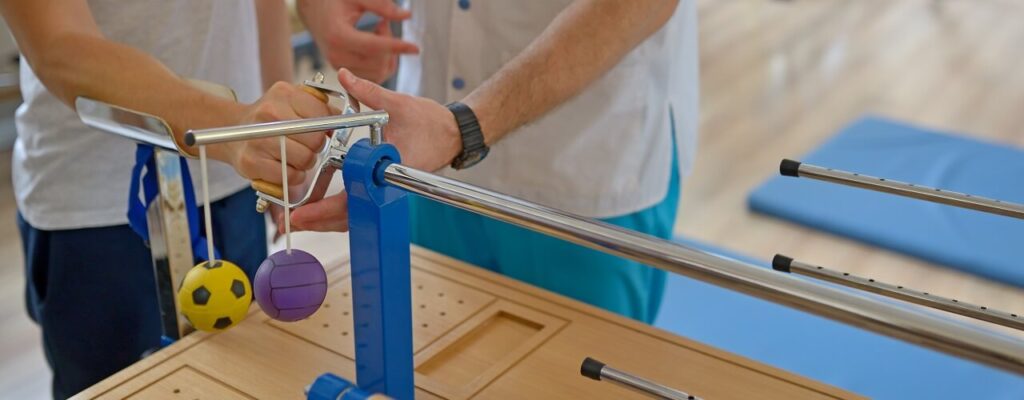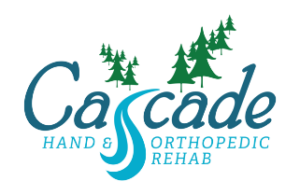Enhance Your Nerve Injury Recovery with Advanced Hand Therapy Techniques

Are you experiencing numbness and tingling in your hands or wrists? Those symptoms usually indicate damage or impairment to one of the five nerves that run through your upper extremities. Fortunately, the hand therapists at Cascade Hand & Orthopedic Rehab offer several nerve injury recovery techniques to help you resolve discomfort without surgery.
Most people struggling with nerve conditions in their upper extremities have some form of nerve compression syndrome, which occurs when an affected nerve becomes compressed or irritated. You’ve probably heard of carpal tunnel syndrome, one of the most well-known examples of nerve compression syndrome.
However, traumatic injuries (such as an automobile accident) can also potentially cause nerve damage, as can conditions like stroke, spinal cord injuries, or multiple sclerosis.
Regardless of the cause, our team of hand and occupational therapists will work with you to find a rehabilitation program that suits your needs. Through various hands-on techniques, we’ll help you restore full functionality to your hand, wrist, elbow, or shoulders–whichever body needs attention.
To get started, call our office to schedule an appointment or speak to one of our friendly upper extremity experts!
Common Nerve Conditions of the Upper Extremities
Your “upper extremity” refers to the entirety of your arm, from your shoulder to the tips of your fingers. The brachial plexus nerve feeds all three of the major nerves of your arm, connecting them to your spinal cord through your shoulder.
Nerve injuries, particularly nerve compression syndromes, generally have the same basic symptoms:
- Sharp pain
- Numbness or tingling
- “Pins and needles” sensations
- Weakness, especially a weakened grip
What varies is the location of these symptoms, as they’ll manifest differently based on which nerve is affected.
Carpal tunnel syndrome is the most common nerve injury in the upper extremities. It affects the median nerve, which runs through the carpal tunnel in your wrist and into your hand, causing symptoms in your wrist, forearm, and fingers (especially the thumb, index, and middle fingers).
However, cubital tunnel syndrome is another nerve compression condition of the upper extremity. This one affects the ulnar nerve, which runs the full length of your arm. When the nerve is compressed at the cubital tunnel in your elbow, it can cause pain in the elbow and numbness and tingling in the hands (especially your pinkie and ring fingers).
Nerve damage to the shoulder generally involves the brachial plexus. Here, the common nerve injury symptoms can radiate down the arm and can often be more severe, including paralysis. You may also experience sharp, burning pain in the shoulder or arm.
Common Nerve Injury Recovery Techniques
Most nerve injuries can resolve with dedicated hand therapy at Cascade Hand & Orthopedic Rehab. In severe cases, you may need to undergo surgery, but our team of hand and occupational therapists will be here to help you through your rehabilitation.
We use several different nerve injury recovery techniques to help you find relief. We customize every treatment program based on the needs of the patient, including their exact symptoms, condition, and overall rehabilitation goals. So while no two plans will look the same, you can expect us to pull from these general techniques:
- Manual Therapy: We have several hands-on approaches at our disposal that can help you manage your symptoms. Soft tissue and joint mobilizations and nerve gliding can help reduce pain and discomfort.
- Therapeutic Exercise: Targeted exercises will help reduce your pain, improve your range of motion, and reduce immobility in the affected area. We’ll provide a tailored program that addresses your specific needs, plus ensure you’re performing all exercises correctly.
- Splinting: Splinting helps immobilize the affected area, working to reduce tension on the damaged nerve–allowing you to get a respite from symptoms while you work on your rehabilitation.
- Movement Modifications: Our therapists can also help you develop strategies to avoid triggering symptoms and aggravating your condition. Most nerve injuries (particularly compression syndromes) result from repeatedly repeating small hand, wrist, or elbow movements. Avoiding repetitive movements can help you manage your symptoms.
What to Expect During Your Sessions
Experiencing symptoms in your hands and fingers doesn’t mean that your hands and fingers are the source of your condition. For that reason, our therapists will first perform a detailed examination to help us understand the exact root of your discomfort.
You can expect us to take a full medical history and carefully review your symptoms during your first session. We’ll also perform several movement screens measuring grip strength, range of motion, and more, which help complete the picture. Once we fully understand your condition, we’ll develop your customized treatment program.
We’ll work through that plan at subsequent sessions, monitoring your progress and making adjustments as needed. Manual therapy techniques can help with acute pain relief, preparing your body for more active treatments, such as specialized exercises.
If you would benefit from splinting or another type of orthoses, we’ll custom design one for you, ensuring a comfortable, effective fit. We’ll also instruct you on how to use it effectively and provide a schedule for wearing it.
We can also work with you to restore your overall functionality, especially as you show improvement. For example, if you struggle to pick up small objects, we’ll provide exercises to “train” you on that particular movement so you can more easily perform day-to-day tasks like using utensils or brushing your teeth.
Start Your Recovery and Discover Which Nerve Injury Techniques Are Right For You
Living with nerve damage in your upper extremities can be challenging. Fortunately, the hand and occupational therapists at Cascade Hand & Orthopedic Rehab are here to help you find a solution that works for your needs!
To schedule an appointment and learn more about the nerve injury recovery techniques that will most benefit you, request an appointment today!
